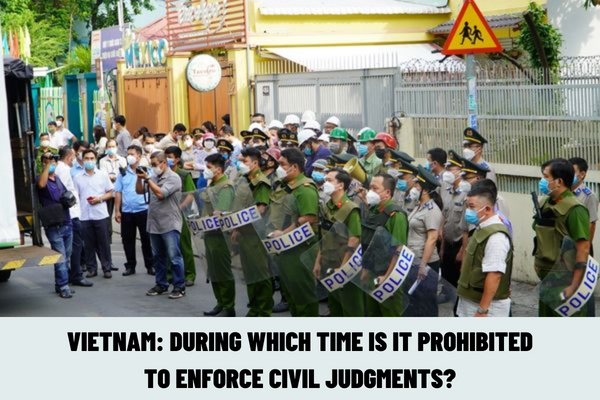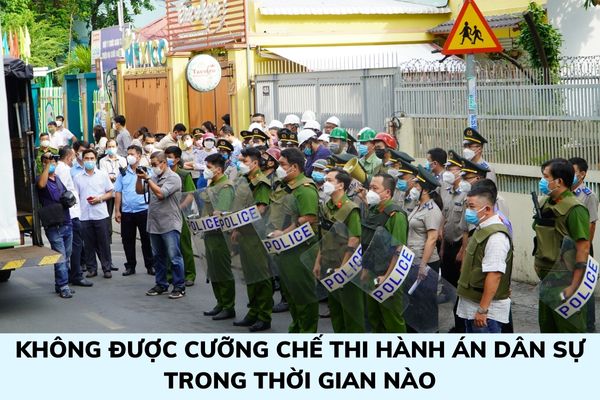Vietnam: During which time is it prohibited to enforce civil judgments? In which cases should civil judgment enforcement be postponed?
During which time is it prohibited to enforce civil judgments?
In Article 46 of the 2008 Law on Enforcement of Civil Judgments in Vietnam stipulating coercive coercive enforcement of judgments in Vietnam as follows:
Coercive enforcement of judgments in Vietnam
1. Upon the expiration of the time limit specified in Clause 1, Article 45 of this Law, judgment debtors with judgment execution conditions who fail to voluntarily execute judgments shall be coerced to do so.
2. No coercive enforcement of judgments shall be conducted from 22:00 hrs to 6:00 hrs, or weekends and holidays as provided by law and in other special cases specified by the Government.
Thus, the periods of non-coercive judgment enforcement include:
- From 22:00 hrs to 6:00 hrs;
- Weekends and holidays as provided by law;
- Other special cases.

Vietnam: During which time is it prohibited to enforce civil judgments? In which cases should civil judgment enforcement be postponed? (Image from the Internet)
What are the cases of postponement of civil judgment enforcement?
In Clause 1, Article 48 of the 2008 Law on Enforcement of Civil Judgments in Vietnam, as amended by Clause 21 Article 1 of the 2014 Law on amendments to some numbers of the Law on Enforcement of Civil Judgments in Vietnam, stipulating the postponement of civil judgment enforcement, including:
- The judgment debtor falls seriously ill as certified by a medical establishment of district or higher level, or has entirely or partially lost his/her civil act capacity under a court decision;
- Judgment debtors’ addresses have not yet been identified, or judgment debtors cannot fulfill by themselves their obligations under the judgments or decisions for other plausible reasons;
- Involved parties agree to postpone the judgment enforcement. The agreement on postponement must be made in writing, clearly stating the postponement duration and bearing signatures of involved parties. In this duration, the judgment debtor shall bear no interest arising from the postponed judgment enforcement, unless otherwise agreed by involved parties.
- Assets for judgment enforcement are accepted by a court for handling under Articles 74 and 75 of this Law; the value of distrained assets defined in Article 90 of this Law is equal to or lower than enforcement expenses and secured obligations upon the reduction of their prices under regulation;
- The judgment enforcement is in the period for competent agencies to explain judgments and decisions and respond to recommendations of civil judgment enforcement agencies under Point b, Clause 2, Article 170 and Clause 2, Article 179 of this Law.
- Asset recipients, persons assigned to nurture involved parties have been properly informed twice of the receipt of assets and to-be-nurtured persons but fail to show up to receive;
- The transfer of rights and obligations for judgment enforcement according to Article 54 of this Law has not been made due to force majeure circumstances or objective obstacles;
- Distrained assets cannot be sold and judgment creditors refuse to receive them for judgment execution under Clause 3, Article 104 of this Law.
What is the order of payment of civil judgment enforcement?
In Article 47 of the 2008 Law on Enforcement of Civil Judgments in Vietnam, as amended by Clause 20, Article 1 of the 2014 Law on amendments to some numbers of the Law on Enforcement of Civil Judgments in Vietnam, stipulating as follows:
Payment of sums of money collected from judgment enforcement and return of assets for judgment enforcement
1. Sums of money collected from judgment enforcement shall, after subtracting judgment enforcement expenses and the sum of money specified in Clause 5, Article 115 of this Law, be used to pay in the following order:
a/ Alimony; salary, wage, severance allowance, job-loss allowance and working capacity loss allowance; compensation for loss of life, damage to health or mental harms;
b/ Court fees and charges;
c/ Other payables under enforced judgments or decisions.
2. In case there are many judgment creditors under a judgment, sums of money collected from judgment enforcement shall be paid as follows:
a/ Payment shall be made in the order specified in Clause 1 of this Article. In case there are many judgment creditors at the same priority level, payment shall be made in proportion to sums of money enjoyable by these creditors;
b/ Sum of money collected under a coercive judgment enforcement decision shall be paid to those who are judgment creditors by the time of issuance of such decision. The remainder shall be paid to those who are judgment creditors under other judgment enforcement decisions by the time of payment;
c/ After making payment under Points a and b of this Clause, the remainder shall be returned to judgment debtors.
3. In case of handling assets in pledge or mortgage whereby pledgees and mortgagees are judgment creditors, or in case of selling assets ruled under the judgment or decision to be distrained to secure the fulfillment of a specific obligation, the sum of money collected from selling distrained, pledged and mortgaged assets shall be paid first of all to pledgees and mortgagees or parties with secured obligations after subtracting court fees, judgment enforcement expenses and sums of money specified in Clause 5, Article 115 of this Law.
In case of handling assets in pledge or mortgage whereby pledgees and mortgagees are not judgment creditors, such pledges and mortgagees shall be paid before other sums of money specified in this Article are paid.
4. The order of payment of sums of money collected from enforcement of bankruptcy judgments must comply with the law on bankruptcy.
5. Within 10 days after collecting money or assets from judgment enforcement, enforcers shall pay such money or return the assets under Clauses 1, 2 and 3 of this Article.
In case involved parties fail to come for their money or assets, such money and assets shall be handled under Article 126 of this Law.
Thus, sums of money collected from judgment enforcement shall, after subtracting judgment enforcement expenses, be used to pay in the following order:
- Alimony; salary, wage, severance allowance, job-loss allowance and working capacity loss allowance; compensation for loss of life, damage to health or mental harms;
- Court fees and charges;
- Other payables under enforced judgments or decisions.
LawNet
